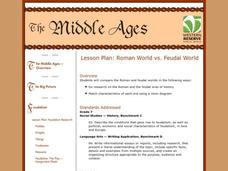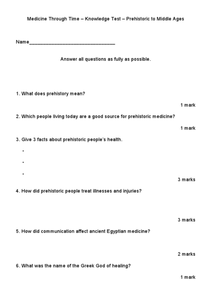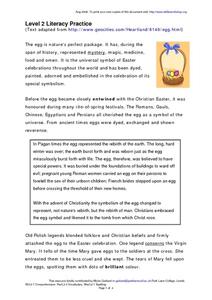Curated OER
Technology and Medicine
Students watch a video and continue with research of Ancient Rome and the quest for knowledge. They form expert groups to study one aspect of life in Ancient Rome and share with the rest of the class.
Northeastern Educational Television of Ohio, Inc.
Roman World vs. Feudal World
Young historians compare the major features of the Roman and feudal worlds, such as religion, social hierarchy, and political tenets, using online resources and group discussion.
Curated OER
Romans of the New World
Who were the Iroquois, and how did they compare with the Romans? Attached is a three-page article and a set of accompanying questions. Only four questions are included, but you could require your readers to write two or three...
Curated OER
Roman or Greek?
In this Greek and Roman words worksheet, middle schoolers unscramble 10 words to spell Greek and Roman words. Students then categorize each of the 10 words they completed as Greek or Roman on a chart.
Jefferson Township Schools
Major Gods: Names, Roles, & Symbols
From Aphrodite to Zeus, here you'll find a PowerPoint presentation identifying basic information about 15 Greek gods and goddesses.
Curated OER
Medicine Through Time
In this medicine in history worksheet, students read through the questions about the history of medicine. Students give short answers to the 18 questions.
Curated OER
Invertebrates in Mythology
Invertebrates play a prominent role in many myths across cultures. From Greece to Guatemala, see if you can identify the invertebrate of importance. Ten multiple-choice questions test your knowledge of mythology from around the world.
Curated OER
The Rise of Islam
In this Islamic medicine worksheet, students read about the rise of Islam and the history of medicine within the culture. Students read 5 passages.
Curated OER
How to Create a Virtual Mediterranean Cruise
Young scholars determine the ports they visit and develop a plan to study each region’s history and culture.
Curated OER
A Field of Beans
Beans, or legumes as they are sometimes called, are the topic for an integrated multi-subject lesson. Youngsters will read, write, observe, and research everything there is to know about beans. They read a bean story, conduct a bean...
Curated OER
The Egg and Symbolism with the Christian Easter
In this language arts and religion worksheet, students read an informative page about the symbolism of the egg in the Christian Easter. Students answer 6 questions. This page is from the UK.
University of Virginia
Etruscan and Roman Medicine
Gives a short description on the practice of medicine in Etruscan and Roman societies. The first doctors came from Greece but Roman medicine tended to be more of a "home remedy," situation.
PBS
Pbs.org: The Roman Empire in the First Century
Young scholars will learn about Roman architecture, technology, and medicine by becoming teachers for a day. Students will participate in a class discussion about Rome's contributions in these areas and then work in small groups to...
University of Virginia
The Surgery of Ancient Rome
This illustrated article dicusses an exhibition on the surgical instruments used by the Roman during ancient times.
Other
Opthalmology in Ancient Rome
A short article on the treatment of eye diseases in ancient Rome. There were doctors who specialized in this practice.
University of Virginia
The Doctor in Roman Society
A short description on the status of Roman doctors. They were not regarded very highly since they cured so few people.
Library of Congress
Loc: Rome Reborn: The Vatican Library & Renaissance Culture
This page chronicles an exhibit hosted by the Library of Congress of manuscripts and documents from the Vatican Library. Includes manuscripts of both a secular and religious nature as well as a detailed history of the Vatican Library....
Famous Scientists
Famous Scientists: Galen
Learn about the man whose medical doctrine dominated the Western and Arab worlds for close to 1500 years.
National Institutes of Health
National Library of Medicine: Medieval Islamic Medicine
A discussion of how Islamic medicine was influenced not only by Greeks and Romans, but also by the restrictions of the Islamic religion.
Dallas Symphony Orchestra
Dallas Symphony Orchestra Kids: Hector Berlioz
Berlioz had intentions to study medicine, but wound up studying music instead. Use this resource to learn more about French composer, Hector Berlioz (1803-1869 CE) and his work. Listen to his "Roman Carnival Overture" using RealAudio or...
Countries and Their Cultures
Countries and Their Cultures: Multicultural America: Mexican Americans
Provides an overview of the traditional culture and lifestyle of Mexican Americans. (Note: Content is not the most current.)
Curated OER
Eternal Egypt: Statue of Asclepius
The statue of Asclepius, Roman god of healing and medicine, portrays him standing with a full face and naked chest. The snake of Asclepius stands beside his right leg.





















